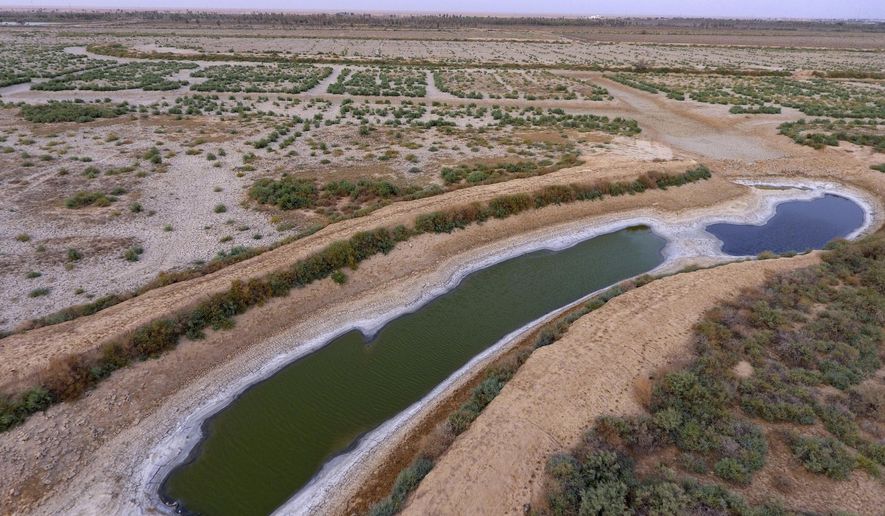BAGHDAD — The Islamic State hold on territory has been broken, but Iraq now faces another existential threat as it battles neighboring Iran and Turkey for access to an increasingly scarce flow of water to the once-flourishing Fertile Crescent running down the spine of the country.
“The decline is dramatic,” said Hassan Al-Jannabi, Iraqi minister of water resources. “Erratic rainfall and construction of dams in neighboring countries has led to a combined decrease of more than 40 percent in annual flow through the Tigris-Euphrates River Basin.”
One of the biggest impacts is from a major Turkish dam project on the Tigris, which flows southward through Iraq from sources in Iran and southern Turkey. Ankara is now filling the Ilisu Dam — a 440-foot-high, 6,000-foot-wide behemoth — about 70 miles north of the Iraqi border.
The Ilisu is projected to decrease Iraq’s share of the Tigris’ flow from some 738 billion cubic feet to just 343 billion cubic feet annually, said Rayan Thannon al-Abbasi, a water specialist at Mosul University’s Regional Studies Center.
“Iraq’s power plants will be affected by this decrease,” Mr. Thannon al-Abbasi said. “The supply of fish in the rivers will be depleted as well.”
Aiming to boost power generation and expand agriculture in southeastern Turkey, the Ilisu Dam has been launched in parallel with an Iranian diversion of the Sirwan River, a tributary of the Tigris, further reducing downstream flow.
Nearly 30 percent of the Tigris’ annual flow originates in Iran, where the Daryan Dam is slated to be completed this year. Iraqi hydrologists have estimated that it would reduce water flow through the Sirwan by as much as 60 percent, leaving much of central and southern Iraq without adequate supplies.
“There is no agreement among the countries on sharing the water resources of the two rivers,” said Fadel Al Zubi, head of the U.N. Food and Agriculture Organization office in Iraq. “Each neighboring country controls the water flow into Iraq according to its interests, needs and circumstances without adhering to any quota or consideration.”
The situation is causing increasing concern in communities across Iraq, where the prospect of water scarcity exacerbates challenges facing a population struggling for normalcy amid volatile politics after more than a decade of war.
Iraq’s neighbors initiated their dam projects at the height of the weakness of the central government in Baghdad, which once had a reputation for bare-knuckle resistance to any foreign infringement on the country’s water flows.
During the 1990s, Turkey diverted the Euphrates River to fill a reservoir for the Ataturk Dam. A stronger Iraqi government at the time threatened to bomb the dam, leading Ankara to slow down its diversion.
In more recent times, Iraqi officials have scrambled for solutions to the shortage of water for agriculture and drinking.
Hussam Botani, an analyst at the Son’i El-Siyasat Policy-Making Center, an Istanbul think tank, said Iraq has “two diplomatic choices to deal with the crisis.” One involves negotiating directly with the Turks, and the other would be to draw the United Nations into the situation as a potential mediator.
Mr. Botani noted that Turkish authorities took a one-month pause in filling the Ilisu Dam after bilateral talks with Baghdad in June. “I hope Iraq can work with the Turks to sign a long-term water sharing agreement and that other countries will help pay for conservation and irrigation programs,” he said. “If that doesn’t work, it can go to the U.N. Security Council to issue a binding decision that warns of the dangers of possible water wars.”
The current free-for-all jeopardizes Iraq’s food security — an irony given how much of Iraq is within the Fertile Crescent, where humanity first developed agriculture.
“With a loss of more than 50 percent of Iraq’s water,” said Mr. Botan, “nearly 3 million square miles of agricultural land in Iraq will be turned into desert.”
The Tigris-Euphrates basin historically received an average combined annual flow of nearly 3 trillion cubic feet. Before the U.S. invasion of Iraq in 2003, Iraqis derived about 20 percent of their electricity from 12 hydropower stations.
The reduced river flows from Turkish and Iranian dams, coupled with climate change and poor maintenance caused by a decline in oil revenue and the recent war with Islamic State, have left Iraqis with a spotty electricity supply.
“Now, we have power in alternating cycles — two hours on, two hours off. This is really tiring,” said Zahraa Al-Hasnawi, a dentist in Hillah, a city of 400,000 people about 60 miles south of Baghdad. “The government doesn’t do basic tasks like dredging the rivers or teaching farmers smart irrigation measures like you see in Jordan.”
The water crisis has led officials in Baghdad, the Iraqi capital, to order farmers to halt cultivation of rice, corn and cereals. The decision intensified a burden already felt by the farmers after the government cut the number of areas allocated for rice production last year.
“Cereal crops can no longer be grown without our authorization,” said Agriculture Ministry spokesman Hamid al-Nayef. “The quantities of water needed are not available.”
As a result, Baghdad has begun purchasing 50,000 tons of wheat from the U.S., Canada and Australia. Some Iraqis openly accuse their government of neglecting the country’s strategic water interests.
“Why is it that only a few months ago, we hear that this drought comes because the dam built by Turkey?” said Ayoub Thannon, a 26-year-old pharmacist in Mosul. “The tap water is getting darker in color and not suitable for drinking. The Iraqi government has to do something to save the water.”




Please read our comment policy before commenting.